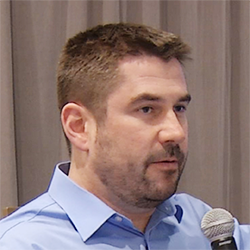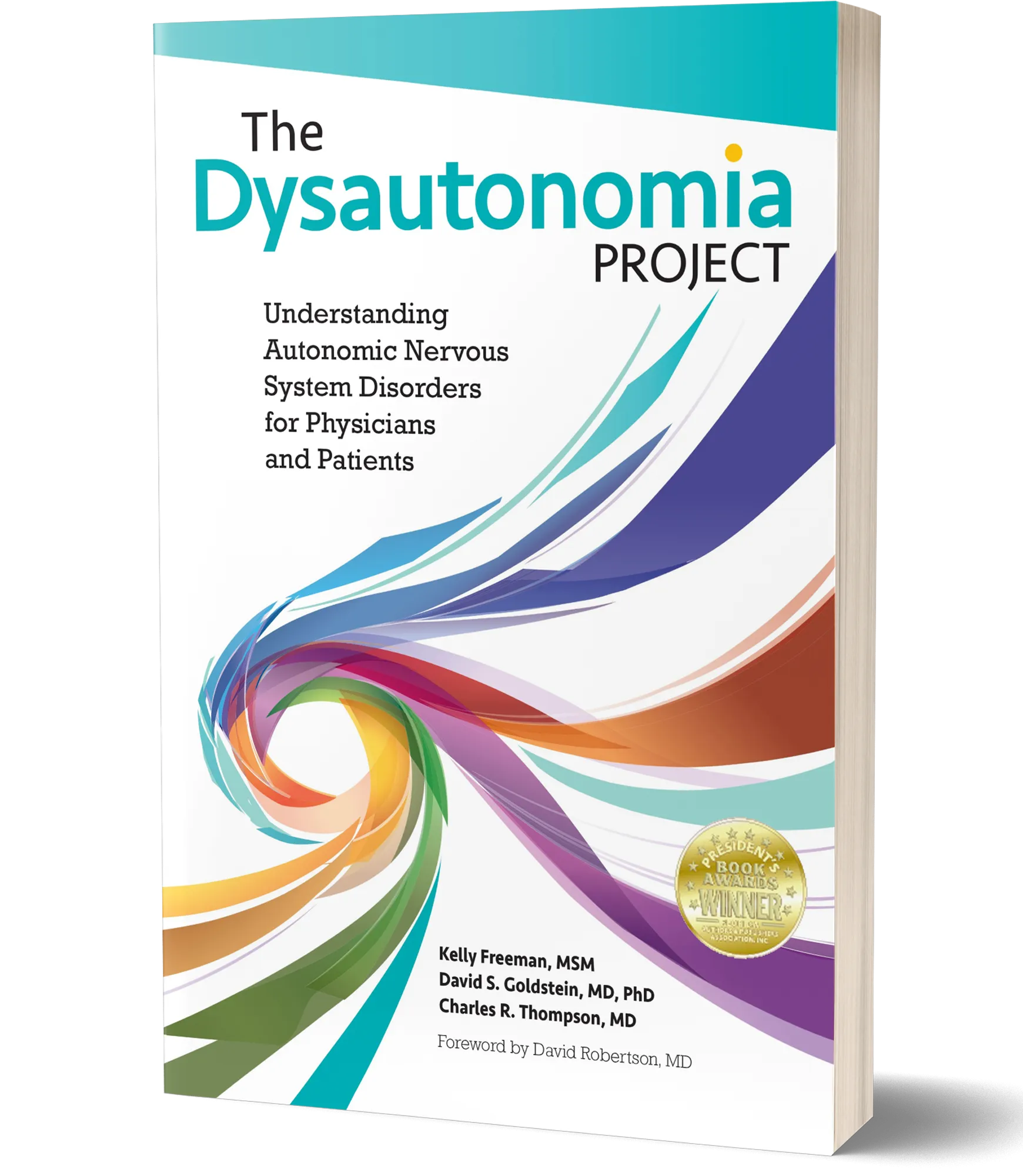Video Transcript
Mr. Al Ruechel: Hi everyone, my name is Al Ruechel we are continuing our conversations and glad you could join us via the web about things that are going on with the autoimmunity and autonomic failure. Joining me right now is doctor Steven Vernino who is the president of the AAS, the American Autonomic Society. Thank you for joining us.
Dr. Steve Vernino: Thanks
Mr. Ruechel: Now that you’re an elected official so much more is expected of you correct? So, give me a little bit of your background working with dysautonomia and those other kind of disorders.
Dr. Vernino: Sure, so I’m a neurologist by training and I initially trained in neuromuscular disorders, at the time I was going through training there wasn’t a specialty such as autonomic disorders or autoimmunity in neurology so that’s been a really major development over the past 20-25 years. We now understand that there are autoimmune diseases that can affect the nerves and as well as the importance of the autonomic nervous system in our functioning and management of all the automatic functions of our body. So, I got gradually interested in those over the years, initially in autoimmunity and how antibodies can influence the body, influence the nervous system and more recently how antibodies and autoimmunities can influence the autonomic nervous system. So, I’m now in Dallas, Texas and we have an autonomic laboratory where we see patients and try to sort out A what sort of autonomic problem they have and B can whether we can understand what the cause is and in some cases that may be autoimmunity.
Mr. Ruechel: So, what did people do prior to us having the knowledge of what might be going on with our bodies?
Dr. Vernino: Well, we treated symptoms in many cases and many patients went undiagnosed and in some cases you had a very poor quality of life and were diagnostic dilemmas and you know obviously there’s been lots of changes in lots of area in genetics, in new medications and MRI scans and so on, so we can better diagnose now then certainly we could 20 or 30 years ago and in the autonomic nervous system that’s been true as well.
Mr. Ruechel: Right and now trying to educate more doctors, more physicians, more nurse practitioners, all those about what to look for to possibly make a diagnosis so that it might fit under this dysautonomia syndrome.
Dr. Vernino: Correct, right so yeah the problem is a lot of medical schools and training programs for doctors don’t spend much, if any attention on the autonomic nervous system and so really the purpose of this series of videos and for the American Autonomic Society is to provide education about what is the autonomic nervous system do, what are the symptoms when it’s not working properly and what sort of diseases, what sort of treatments are available for patients.
Mr. Ruechel: Ok, so why don’t medical schools pay attention to it? Why didn’t they?
Dr. Vernino: I think it’s a field that falls between the specialties. So we as neurologists have taken on autonomic nervous system because it’s a part of the nervous system, there are cardiologists who are interested in the autonomic nervous system because of the effects of blood pressure and heart rate. But it crosses over all of those things, gastroenterologists run into issues with the autonomic nervous system, so in some ways it effects all specialties but for that same reason often none of the specialties are specifically tasked to be responsible for the autonomic nervous system.
Mr. Ruechel: And because it involves this holistic universe sometimes is the way it’s been described you almost don’t know “Where do I start?” because doctors often start with checklists and go down the checklist, not that, not that, not that.
Dr. Vernino: Yeah, it can be very daunting you know particularly when our time with a patient is limited in the office and particularly with the autonomic nervous system disorders like you said they have a checklist of so many symptoms and so many systems involved that it can be overwhelming at times and there’s a tendency for doctors to pull back sometimes and focus on what they know, rather than look at the big picture.
Mr. Ruechel: Well, or what they think they can fix because isn’t that almost what patients demand? What’s wrong with me? Now fix me.
Dr. Vernino: They want to feel better that’s right.
Mr. Ruechel: So, let’s define a couple things. So, autoimmunity, define that for me so we know what it is.
Dr. Vernino: So, we all have an immune system and it’s important for fighting off infection and fighting off cancer in our body and other important functions. But in some cases, the immune system goes haywire, gets mixed up, and starts to attack our own body, and that’s what we call autoimmunity or immunity against our self. And there are a lot of well recognized autoimmune disorders lupus, rheumatoid arthritis, and so on and we’re increasingly realizing there are a lot of autoimmune disorders of the nervous system, multiple sclerosis, myasthenia, and other things like that. It’s important to recognize because this is our own body that’s sort of out to get us if you will, and there are ways to understand that that’s going on, and potentially treat it. We now have medications that can turn down the immune system in some cases and can be effective treatment for autoimmune disorders.
Mr. Ruechel: When you talk about autonomic failure versus autonomic dysfunction, sometimes you’re reading some of the literature, that that becomes a real issue.
Dr. Vernino: Yeah, so there’s lots of ways the autonomic nervous system can misbehave, and probably the simplest scenario is autonomic failure where the autonomic nervous system just doesn’t work and so when we stand up instead of the autonomic nervous system regulating our blood pressure, the blood pressure falls, people feel faint, they pass out or with respect to the gastro, GI, symptoms if the autonomic nervous system doesn’t work the guts don’t move, food doesn’t move along, the stomach doesn’t empty there’s severe constipation. If the sweating glands don’t work, we can’t sweat, we get overheated very easily. So, when the autonomic nervous system fails there’s a lot of bad symptoms that occur. But, there’s another group of patients that is more common that we sometimes call dysautonomia where instead of the autonomic nervous system being just kind of broken and not working, some of the autonomic reflexes are not working properly. So, a good example would be postural tachycardia syndrome where one stands up, instead of the blood pressure and heart being regulated and staying put, the heart gets very high and people feel bad for that. So, it’s not just that the autonomic system doesn’t work in some conditions it may be working overactive.
Mr. Ruechel: Here’s another term I want to talk about called AAG, which is autoimmune autonomic ganglionopathy, what is that?
Dr. Vernino: So, that’s a very specific autoimmune disorder of the autonomic nervous system and it’s a disease I’ve studied for 20 years or more. And what goes on in AAG is that the body is part of this autoimmune condition makes an antibody and antibodies are good when they’re fighting off viruses and so on, but if the body makes an antibody against one of our own body proteins, in this case a receptor that’s very important in the autonomic nervous system, that can cause autonomic failure because the antibody prevents signals from getting from the brain and the spinal cord out to the blood vessels and heart and so on. So, it’s a condition where there’s autonomic failure because the autonomic reflexes don’t work and it’s autoimmune because it’s by an antibody. So, over the course of time we’ve been able to make a reliable test that’s now commercially available, so in cases where people are suspected to have autoimmune autonomic ganglionopathy, we can talk about the symptoms of that in a minute, there is now confirmatory tests one can do at the laboratory to help make the diagnosis.
Mr. Ruechel: So, what are the symptoms of that?
Dr. Vernino: Yeah so, like autonomic failure as I was mentioning before, one of the major symptoms is what we call orthostatic hypotension so when someone stands up their blood pressure drops, and it can be quite precipitous, so we’ve had people who’ve dropped their blood pressure from a normal level down to a systolic blood pressure in the sixties which is not enough to keep the blood flowing to the brain and so those people you gave to sit down or lie down or they’re going to pass out. But, in fact this condition impacts all of the other autonomic functions. So, another major symptom is gastrointestinal problems, these patients have really profound, severe constipation and they may go days and days without having a bowel movement or bladder retention, they can’t empty their bladder, they can’t sweat. Their mouth is dry or their eyes may be dry from not making tears and not making saliva appropriately and even in some severe cases even some of the core autonomic reflexes like your pupils constricting to light, even that doesn’t work right. So, those constellation of all of those symptoms together particularly severe orthostatic hypotension and severe constipation, especially if it’s come on rather suddenly it should make one think about AAG as a diagnosis.
Mr. Ruechel: Now talking about the antibodies that are circulating the body and now I know I’m being oversimplistic about this but why can’t you just remove those?
Dr. Vernino: Well you can. There is a treatment that we sometimes use called plasma exchange therapy and I should point out first of all that AAG is a very rare disease and so none of the things I’m talking about are studied in big multicenter double blind trials so this is all based on experience. So, plasma exchange is a treatment, fairly simple that you use a big IV and you take the blood out and basically use a machine to wash out the antibodies and then you give the patient’s blood back. So, plasma phoresies or plasma exchange. So, that actually works pretty well for these antibody disorders, the problem is that you removed the antibodies but you haven’t removed the white blood cells that are making the antibodies and so within a few weeks those antibodies come back and you’re right back where you started. So, typically the treatment has to consist of something like plasma exchange to treat the antibodies along with another immune treatment that’s going to reduce the production of antibodies or turn down the immune system.
Mr. Ruechel: So, we’re trying to educate people right now, so if there are physicians watching this right now based on autoimmunity and autonomic failure what do you want them to know, one thing to walk away from this?
Dr. Vernino: So, the main thing is that patients will present with very disabling symptoms and it’s important to think about the autonomic nervous system and probably the most important thing that people can do whether it’s in the ER or the primary care clinic is actually measure blood pressures laying down and standing up along with heart rate which gives you a lot of information about whether you’re dealing with autonomic failure, orthostatic hypotension or one of these dysautonomia conditions; so that test alone, which anybody can do, will give you a lot of information. The other part is that the autoimmune autonomic ganglionopathy is very rare but there’s a lab test available for it, so if you think of other diseases as well and increasingly, we’re recognizing that autoimmunity is important in a lot of other conditions including probably other autonomic conditions as well.
Mr. Ruechel: Doctor thank you so much and good luck again as the term president of the AAS.
Dr. Vernino: Thank you, great.
Visit our Education Center for Autonomic Disorders for additional video resources for patients and providers.

Wolfgang Singer, MD
Associate Professor of Neurology
Mayo Clinic Rochester, MN































